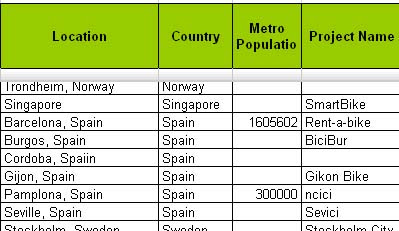 What a year for bike-sharing and The Bike-sharing Blog. When I started researching bike-sharing in 1995, it was considered a wacky idea that was only in use at that time in Copenhagen, Denmark. When I shared this 2nd generation ("low tech") idea with folks once I returned home, the usual reply I heard was that it sounded like a good idea, but it would only work in a socialist country like Denmark. Anywhere else, they claimed, bike-sharing would fail miserably.
What a year for bike-sharing and The Bike-sharing Blog. When I started researching bike-sharing in 1995, it was considered a wacky idea that was only in use at that time in Copenhagen, Denmark. When I shared this 2nd generation ("low tech") idea with folks once I returned home, the usual reply I heard was that it sounded like a good idea, but it would only work in a socialist country like Denmark. Anywhere else, they claimed, bike-sharing would fail miserably.Really?
Bike-sharing has spread considerably since then with there being more than 60 programs in existence with likely hundreds more in planning from what I hear and see through my bike-sharing business, MetroBike LLC. And what a year for bike-sharing 2007 was! Here we are at the end of the year and bike-sharing is becoming a commonly understood concept that has captured the minds of folks from around the world. Bike transit is spreading fast. (Did the subway concept spread as fast when it was invented over 100 years ago?) With Bicing and then Velib' having launched in the spring and summer, international attention was focused on the formerly wacky idea which has now made it mainstream in Europe and hopefully the same will be true in North America, Asia, Australia, Africa, and South America in 2008. I know of efforts underway on most continents for bike-sharing.
Hopefully, The Bike-sharing Blog has assisted with the spread of information and lead to getting more programs up-and-running. I see folks from around the world are reading the Blog. They are average citizens and elected officials from the local, state/provincial, and national level. I've received questions from many and have been informed about what's going on where they live by readers. Keep those emails about bike-sharing programs coming in from your corner of the world!
When I started this blog in May of this year, I didn't have any clue just how popular it would become. It was being viewed by a few people each day then, but now the Blog is being viewed much more and by an international audience. I'm glad it's been a useful service and I plan to continue writing it.
If your city, town, campus, etc. has yet to develop its own bike-sharing program, write your local elected officials and tell them about this great idea. Let's get everyone on a bike in 2008. It's but one of the many ways we can save this tiny planet of ours.
Here's to a happy and healthy 2008!
Sincerely,
Paul DeMaio
MetroBike LLC
Washington, DC




